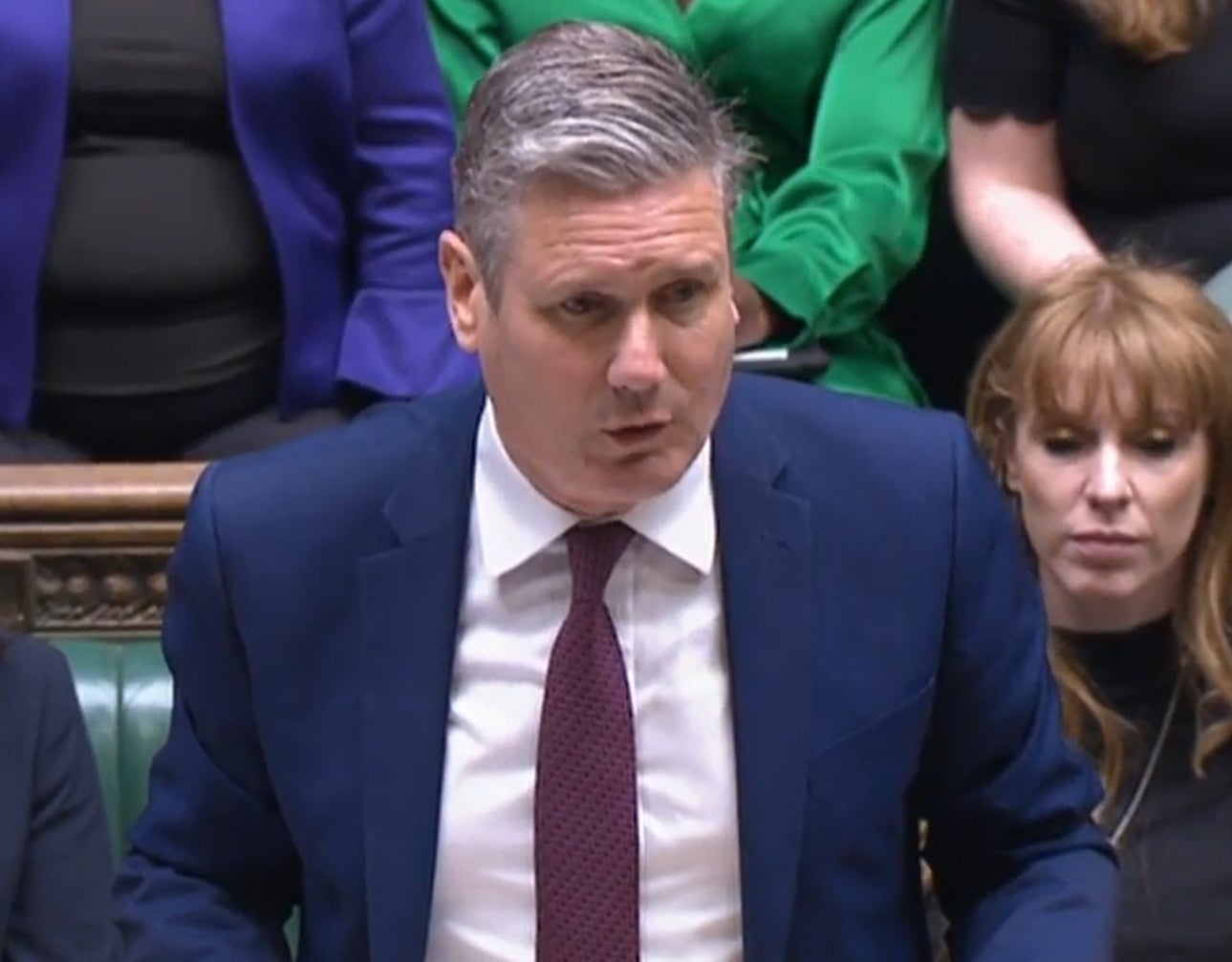Keir Starmer finally came into his own against a prime minister on the defensive
The Labour leader made the most of his moment in the Commons, writes John Rentoul


Perhaps it was because he was relaxed that Keir Starmer had his best outing at Prime Minister’s Questions today. All attention was on the Sue Gray report, which had just been published and on which Boris Johnson was about to make a statement.
So the Labour leader knew that there was no pressure to score points in the preliminary exchanges. As a result, he succeeded in embarrassing Johnson over his imminent U-turn in adopting Labour’s policy of help with energy bills paid for by a windfall tax. “It sounds like he’s finally seen sense,” Starmer commented casually.
Johnson, who was subdued as he prepared to come across as ever so humble in his apology for lockdown law-breaking, went through the motions of fighting back, asserting that there was “nothing original about a Labour plan to put up tax”.
Starmer pointed out that he had been calling for a windfall tax for four and a half months, and said: “I’m told that hindsight is a wonderful thing.” It has taken him some time, but the Labour leader has finally found an effective response to Johnson calling him Captain Hindsight.
He followed it up with a withering question: “What is it about the Sue Gray report that first attracted him to a U-turn this week?” The noise in the chamber was telling. Labour MPs were significantly louder than the government side. Both sides know that the prime minister and chancellor would like to announce a mini-Budget tomorrow in an attempt to distract attention from Downing Street parties and “move on”.
When Starmer warned of the twin dangers of inflation and low growth, Johnson fell back on the standard accusation that his opponent was “running this country down”. Unusually, Starmer improvised a response: “He talks about running this country down; he is running this country down.”
The prime minister had a couple of effective lines, pointing out that Starmer had claimed repeatedly that the UK had the highest Covid death toll in Europe: “He was proved completely wrong and never apologised.” This is true, but hardly relevant at the moment. And Johnson pretended to call Jeremy Corbyn “Vladimir Corbyn” by mistake, saying Starmer had tried to get him elected prime minister. Childish, but it probably works, a bit.
Then came the main event. Johnson made his statement on Sue Gray’s report, trying to sound penitent without sounding weak. He tried to minimise his crime while taking responsibility for everything that has ever happened anywhere. He apologised “for the short lunchtime gathering” for which he was fined, but said Downing Street is a big place and a lot of people work there, as if he couldn’t possibly know what they were all doing.
He made a few mistakes, calling Gray “Sue” – which he did again repeatedly in the news conference. And he said: “The entire senior management has changed.” This prompted gales of laughter from the opposition, because there was one rather obvious exception to this Augean clearout.
Starmer rose to respond, with the advantage of having warmed up earlier. He was never going to deliver a knockout blow, partly because Gray’s report failed to provide significant new damning information, so his job was simply to look prime ministerial himself and to make the actual prime minister look small. In that, he succeeded. “I’ve been clear what leadership looks like,” he said, referring to his pledge to stand down if he were served with a penalty notice, which he now repeated in the Commons for the parliamentary record.
That was all he needed to do, and he did it well.
Johnson quickly forgot his claim to have been “humbled”, and counterattacked Starmer’s “sanctimonious obsession” with the question of whether the prime minister and his staff had broken the law.
By then he could sense that he was going to get through it. Not least because so many opposition MPs asked the same question: why wouldn’t he resign? Only a very few asked potentially difficult questions about whether there had been any negotiations between No 10 and Gray over the extremely limited reference in Gray’s report to the “Abba” party in the Downing Street flat that was alleged to be celebrating Dominic Cummings’s departure in November 2020.
To keep up to speed with all the latest opinions and comment, sign up to our free weekly Voices Dispatches newsletter by clicking here
But the main reason the report failed to threaten Johnson’s hold on power was that it contained no evidence that he had been warned that some gatherings might break the guidelines or the law at the time. That would have been the only way it could be shown that he had “knowingly” misled parliament when he said the rules were followed at all times.
Gray reports that Lee Cain, the deputy director of communications, warned Martin Reynolds, the prime minister’s principal private secretary, that the “bring your own booze” event in the Downing Street garden was “somewhat of a comms risk”. But there is no evidence that these concerns were conveyed to Johnson. Gray reports: “Dominic Cummings has also said that he too raised concerns, in writing. We have not found any documentary evidence of this.”
Once again, an attempt by Cummings to unseat his former boss has come to nothing.
For Starmer, the Gray report was possibly the best possible outcome: enough to wound Johnson, but not enough to oust him. And a chance for Starmer to shine as a leader of integrity and an alternative prime minister.






Join our commenting forum
Join thought-provoking conversations, follow other Independent readers and see their replies
Comments